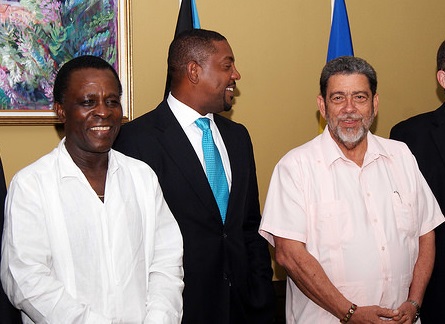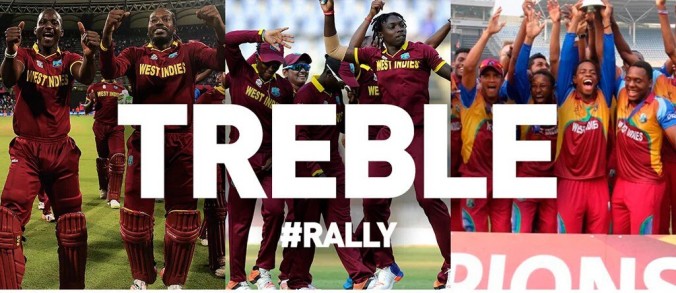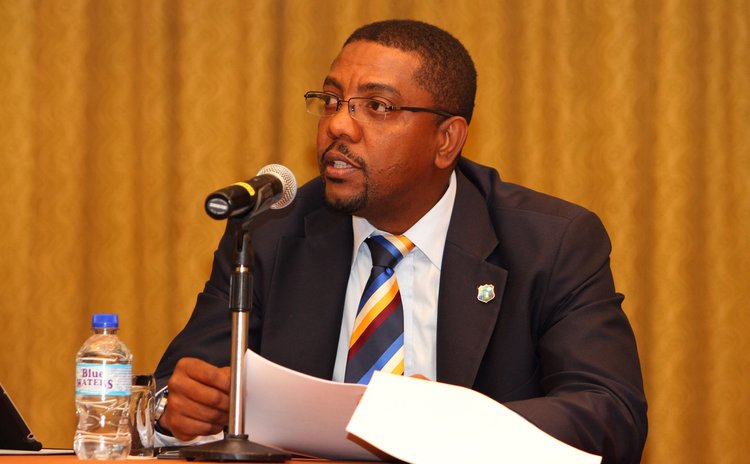By Zaheer E. Clarke
Published January 22, 2018
Some have suggested that a State of Emergency may be warranted in West Indies cricket. CWI President Dave Cameron has been enacting radical changes to West Indies cricket’s structure. Will he get to see the changes bear the intended fruits?

Prime Minister Andrew Holness (right), flanked by his national security minister Robert Montague (centre) and the Chief of Defence Staff Major General Rocky Meade (left), declared last week a State of Public Emergency for the parish of St James in Jamaica.
(Source: Jamaica Information Service)
Last week Thursday, the Prime Minister of Jamaica, Andrew Holness, placed the parish of St James under a state of public emergency. St James, whose capital Montego Bay is dubbed the tourism capital of the country, has been under siege in recent years by an upsurge in crime.
In 2016, the murder rate for St James topped all parishes in Jamaica at 140 murders per 100,000 residents. Bearing in mind that the most murderous countries in the world have murder rates at approximately 80 murders per 100,000 residents, the situation in St James was indeed troubling. In 2017 there was no respite in St James as murders ascended to even more alarming levels at 180 murders per 100,000 residents. As such, last Thursday, Operation Take Back St James or Montego Bay – as some have called it – was in full execution as hundreds of soldiers and police officers patrolled several communities and major exit points in St James.

Grenada’s Prime Minister Dr Keith Mitchell (left) and St Vincent and the Grenadines Prime Minister Dr Ralph Gonsalves (right) are among those who have called for the dissolution of the CWI and/or for CWI President Dave Cameron (centre) to step down.
With West Indies performances in cricket seemingly descending to new depths, some individuals are seemingly open to a similar State of Emergency declaration and a ‘Take Back West Indies Cricket’ operation. An operation of that nature was proposed a few years ago when several stakeholders of West Indies cricket including heads of government suggested dissolving the Cricket West Indies (CWI) board. At the time, like many when the State of Emergency was suggested for St James, there was not full support for the action. However, the tune for some could change with respect to West Indies cricket.
Montego Bay is the gateway by which Jamaica’s economy has trod waters in recent years. With the bauxite industry grinding to halt a few years ago, the main foreign exchange provider has been tourism and Montego Bay has been the proverbial floodgate for tourism arrivals via air or sea into Jamaica. The tourism sector in Jamaica boomed with record stopover arrivals practically every year. However, so too has the crime and the murder rates ballooned in St James in the past few years, threatening the principal driver of the Jamaican economy.

Digicel Group CEO, Colm Delves (left), and CWI President, Dave Cameron complete the signing of the sponsorship contract in 2013.
Similarly, under Dave Cameron’s presidency in the past four years, West Indies has surged from alleged debt to profitability. A month ago, CWI announced that for the third consecutive year they have recorded a surplus. This is a remarkable achievement bearing in mind the reports of financial austerity and extreme paucity of the past.
According to a CWI release in December, President Cameron remained optimistic that “the policies in place and the newly formulated strategic plan will continue to keep the organization’s financial management efficient.”
Nevertheless, for the average fan of West Indies cricket, profitability has not been its concern. The concern of the average fan is the product on the field which has been startlingly pitiable in the past three years especially in the longer formats of Test and ODI cricket. To be fair, improvements were seen in the Test format in 2017 with West Indies winning three of ten Test matches. This was a significant improvement on the one win recorded in each of the previous two years. However, in the ODI format and collectively for the past three years, West Indies has not been extremely competitive in world cricket.
During the summer of last year, CWI enacted their form of a State of Emergency or a Zone of Special Operations (ZOSO) when direct qualification for the 2019 ODI World Cup was threatened. The CWI disregarded its rigid team selection policy and declared an amnesty that saw the return of several so-called stars to the ODI team. Unfortunately, that move by the board has not yielded any positive results for West Indies in the ODI format. In fact, since the amnesty, West Indies has lost seven of eight matches with the other game ending in a no result due to rain.
Just under two years ago, West Indies cricket was on a high after its under-19 team won the 2016 ICC under-19 World Cup followed by its senior men’s and women’s teams winning the ICC T20 World Cups. Since then, however, the West Indies men’s team have failed to qualify for the ICC Champions Trophy and are currently facing a qualification tournament for the 2019 ICC World Cup in two months due to its low ranking in the ODI format. In addition, their under-19 team, the defending World Cup champions crashed out of the 2018 edition last week losing their first two matches in the group format to New Zealand and South Africa. Lastly, when the ICC awards named the Test and ODI teams of 2017, not one West Indian men’s player made any of the teams.

President Cameron has admitted that financially, 2018 could be considered a difficult year ahead up to September. In fact, West Indies does not have any tours against the Big Three teams (India, Australia and England), which are their main revenue generators, until October of 2018.
Conversely, 2018 may well be a difficult year on the field in West Indies cricket. If the West Indies men’s team fails to qualify for the 2019 World Cup and their women’s team performs poorly as hosts in the ICC Women’s World T20 championship later this year coupled with the under-19 boys crashing out of the ICC under-19 World Cup, the roars for a State of Emergency in West Cricket may grow louder.

CWI has elicited the input of fans on how to improve their engagement with West Indies cricket. Will some of the fans in turn call for a State of Emergency?
(Source: St Lucia Sports Online)
Last month, Cameron and the Board of Directors of CWI accepted the recommendations for a five-year strategic plan, which, among other things, seeks to produce world-class players and winning teams. To be frank that is all the West Indian fan cares about: winning. CWI has promised to make some key announcements this month regarding new player contracts, a player registration system and the push towards strengthening regional competitions of all formats.
If this plan reaps no fruits on the field in the coming year, Cameron will find it problematic in seeking another term as president. He may well be a casualty of a failed process in the eyes of West Indian fans and delegates come 2019. Is a State of Emergency for West Indies cricket warranted now? Or, should Cameron be given more time for his revolutionary plans to bear appreciable fruits?

CWI President Dave Cameron has made radical and oftentimes unpopular changes to the structure of West Indies cricket. The product on the field has not borne abundant fruits just yet. Will he survive to complete the turnaround?
(Source: Sportskeeda)
Until next time…
Zaheer E. Clarke is a sports columnist, freelance sportswriter and a multi-award-winning blogger. He can be reached at zaheer.clarke@gmail.com. Follow him on Facebook at Zaheer Facts, Lies & Statistics, or on Twitter at @zaheerclarke.
This blog article was published in the Western Mirror on January 22, 2018.
